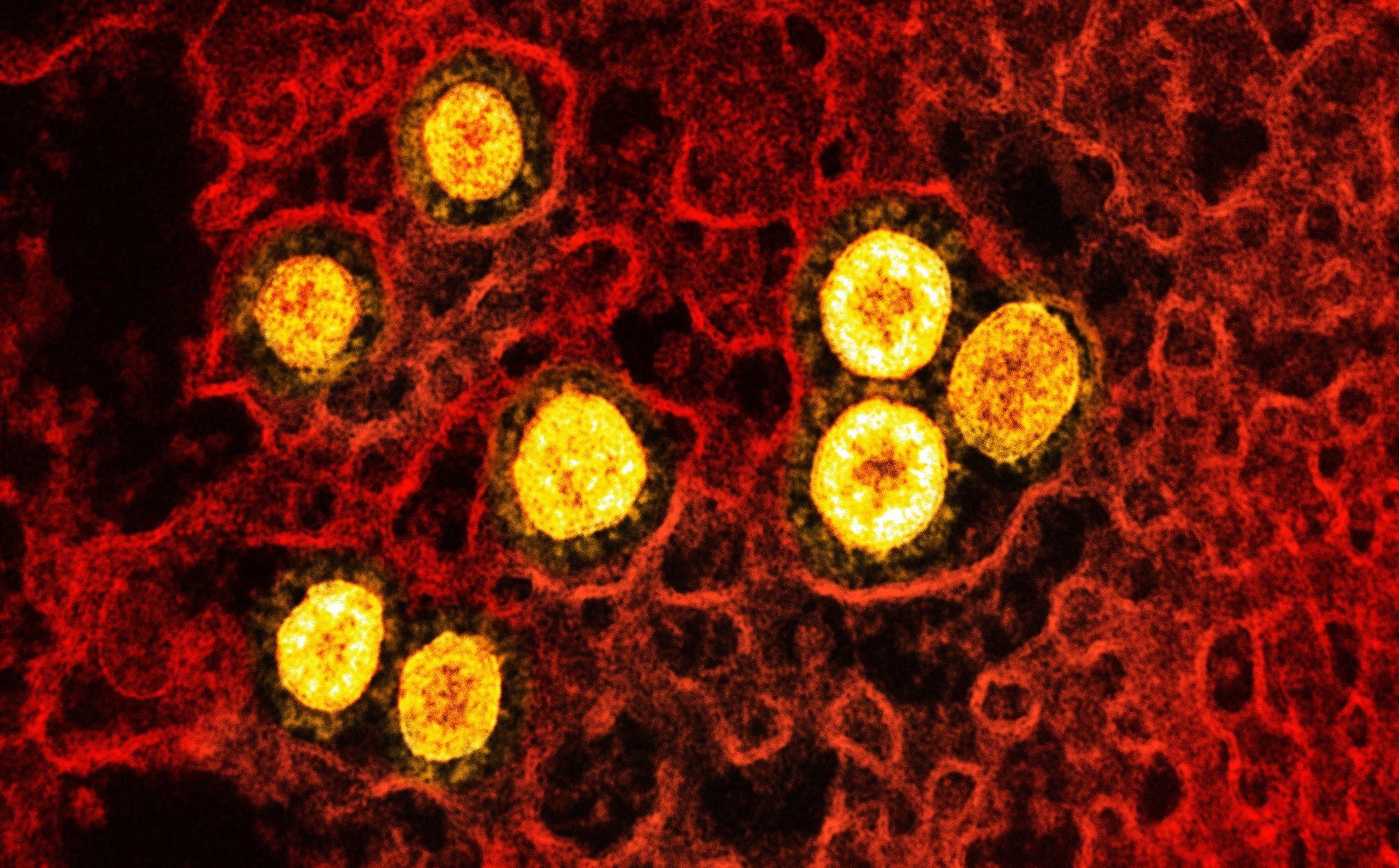In a recent study posted to the bioRxiv* pre-print server, researchers from Washington University School of Medicine, Moderna, Inc, and the U.S. National Institutes of Health tested two bivalent severe acute respiratory syndrome coronavirus 2 (SARS-CoV-2) vaccines based on the messenger ribonucleic acid (mRNA) platform.
 Study: Bivalent SARS-CoV-2 mRNA vaccines increase breadth of neutralization and protect against the BA.5 Omicron variant. Image Credit: NIAID
Study: Bivalent SARS-CoV-2 mRNA vaccines increase breadth of neutralization and protect against the BA.5 Omicron variant. Image Credit: NIAID

 This news article was a review of a preliminary scientific report that had not undergone peer-review at the time of publication. Since its initial publication, the scientific report has now been peer reviewed and accepted for publication in a Scientific Journal. Links to the preliminary and peer-reviewed reports are available in the Sources section at the bottom of this article. View Sources
This news article was a review of a preliminary scientific report that had not undergone peer-review at the time of publication. Since its initial publication, the scientific report has now been peer reviewed and accepted for publication in a Scientific Journal. Links to the preliminary and peer-reviewed reports are available in the Sources section at the bottom of this article. View Sources
Background
The SARS-CoV-2 new variant of concern (VOC) Omicron and its subvariants have diminished the effectiveness of coronavirus disease 2019 (COVID-19) vaccines strengthening SARS-CoV-2 transmission further. Multiple mutations (over 30) in the spike (S) protein of Omicron sublineages have enabled them to evade neutralization by the vaccine- and infection-induced antibodies.
To some extent, boosters of mRNA vaccines overcame the loss in vaccine efficacy against Omicron strains. Yet, researchers continue to work on mRNA vaccines with Omicron-matched S proteins. One such vaccine, mRNA-1273.529 containing Omicron BA.1-matched S, reduced the viral burden in the lungs of mice and non-human primates infected with BA.1.
Likewise, a previous study showed that mRNA-1273.211 encoding Wuhan-1 and Beta VOC S proteins induced higher neutralizing antibody titers in humans against Beta, Delta, and Omicron BA.1 than the parental mRNA-1273 vaccine. Overall, bivalent vaccines encoding S proteins from ancestral and newly-emerged SARS-CoV-2 VOCs could broaden COVID-19 vaccine-induced immunity.
About the study
In the present study, researchers assessed the immunogenicity and immune protection offered by two bivalent vaccines authorized for use in Europe and the United States containing two mRNAs encoding Wuhan-Hu 1 and BA.1 or B.A.4/5 S proteins.
The former vaccine formulation, mRNA-1273.214, contained a 1:1 mixture of mRNAs encoding Wuhan-1 and BA.1 S; whereas the latter, mRNA-1273.222, had a 1:1 mix of mRNAs encoding Wuhan-1 and BA.4/5. First, the team vaccinated BALB/c mice with a two-dose series of the bivalent and its constituent monovalent mRNA vaccines. Then, seven months later, they boosted K18-human angiotensin-converting enzyme (hACE2) mice with a 0.25 µg dose of phosphate buffered saline, mRNA-1273, mRNA-1273.214, or mRNA-1273.222.
Study findings
The primary vaccination series of all tested vaccines induced robust serum antibody binding responses against S2P, S2P.529, and S2P.045 proteins, although the mRNA-1273.529 and mRNA-1273.045 vaccines had lower titers against non-matched S antigens. However, bivalent vaccines had exceptional neutralization breadth. They potently neutralized Omicron BA.1., BA.4/5, and Wuhan-Hu1 pseudoviruses.
The mRNA 1273 boosted K18-hACE2 mice had moderately high neutralizing antibody titers against SARS-CoV-2 Wuhan-Hu1 strain and B.1.617.2 variant. However, these mice had no neutralizing antibodies against Omicron BA.1 and BA.5, similar to that seen in humans. Conversely, bivalent mRNA-1273.214 and mRNA-1273.222 vaccine boosters induced higher neutralizing antibody responses against BA.1 and BA.5. Additionally, they provided slightly increased protection against infection and inflammation in the lung. Overall, bivalent vaccine boosters targeting Omicron subvariants showed immense benefit compared to a monovalent mRNA-1273.529 vaccine.
The authors did not observe the protective effect of bivalent and mRNA vaccine boosters in the nasal turbinates of the test animals. A possible explanation could be that other components of immunity (e.g., T cells) might be involved in immune protection in the upper respiratory tract (URT). In fact, URT is also less penetrated by immunoglobulin G.
Conclusion
The current study provided data favoring the roll-out of BA.1 or BA.4/5-based bivalent boosters in the U.S. and Europe as both bivalent vaccines confer increased neutralizing titers and protection in the lungs against Omicron BA.5.

 This news article was a review of a preliminary scientific report that had not undergone peer-review at the time of publication. Since its initial publication, the scientific report has now been peer reviewed and accepted for publication in a Scientific Journal. Links to the preliminary and peer-reviewed reports are available in the Sources section at the bottom of this article. View Sources
This news article was a review of a preliminary scientific report that had not undergone peer-review at the time of publication. Since its initial publication, the scientific report has now been peer reviewed and accepted for publication in a Scientific Journal. Links to the preliminary and peer-reviewed reports are available in the Sources section at the bottom of this article. View Sources
Journal references:
- Preliminary scientific report.
Bivalent SARS-CoV-2 mRNA vaccines increase breadth of neutralization and protect against the BA.5 Omicron variant, Suzanne M. Scheaffer, Diana Lee, Bradley Whitener, Baoling Ying, Kai Wu, Hardik Jani, Philippa Martin, Nicholas J. Amato, Laura E. Avena, Daniela Montes Berrueta, Stephen D. Schmidt, Sijy O'Dell, Arshan Nasir, Gwo-Yu Chuang, Guillaume Stewart-Jones, Richard A. Koup, Nicole A Doria-Rose, Andrea Carfi, Sayda M. Elbashir, Larissa B. Thackray, Darin K. Edwards, Michael S. Diamond, bioRxiv pre-print 2022, DOI: https://doi.org/10.1101/2022.09.12.507614, https://www.biorxiv.org/content/10.1101/2022.09.12.507614v1
- Peer reviewed and published scientific report.
Scheaffer, Suzanne M., Diana Lee, Bradley Whitener, Baoling Ying, Kai Wu, Chieh-Yu Liang, Hardik Jani, et al. 2022. “Bivalent SARS-CoV-2 MRNA Vaccines Increase Breadth of Neutralization and Protect against the BA.5 Omicron Variant in Mice.” Nature Medicine, October. https://doi.org/10.1038/s41591-022-02092-8. https://www.nature.com/articles/s41591-022-02092-8.